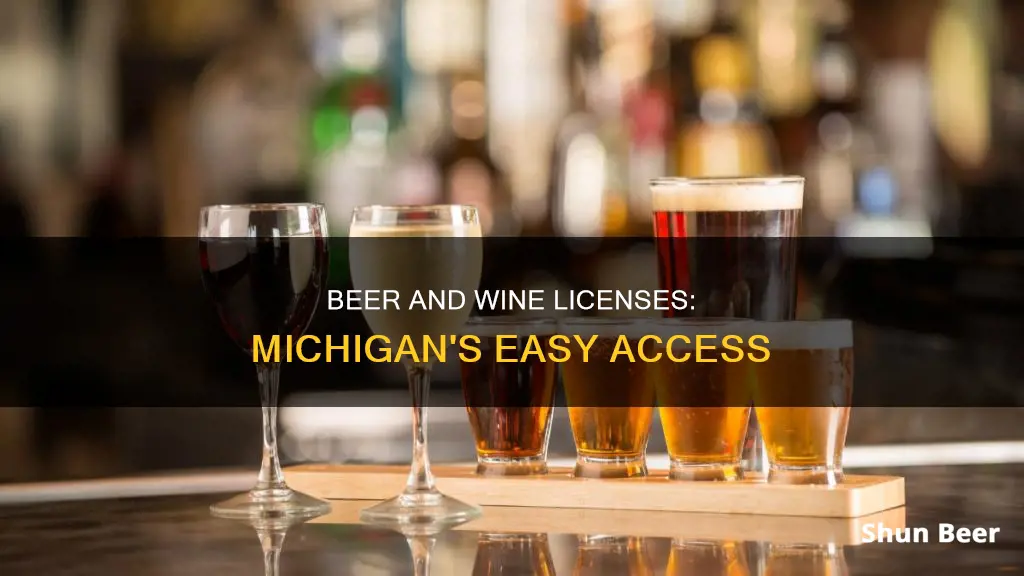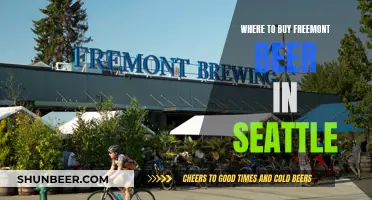
If you're looking to sell beer and wine in Michigan, you'll need to obtain a liquor license. The process can be lengthy, involving several steps, and you'll need to be at least 21 years old. The Michigan Liquor Control Commission controls all alcoholic beverage traffic within the state and issues several types of licenses, including those for manufacturers, distributors, and retailers. The type of license you'll need depends on your business type and the beverages you plan to sell. For example, a company selling directly to the public requires a different license from one that manufactures alcoholic drinks.
What You'll Learn

License types and costs
The cost of a liquor license in Michigan depends on the type of license, license purpose, and any additional services required. The Michigan Liquor Control Commission (MLCC) categorises licenses into three "tiers": manufacturers, distributors, and retailers.
Manufacturers
This tier includes breweries and wineries. To obtain a manufacturer license, you need to submit the following:
- A completed application
- Livescan fingerprint form
- Inspection, license, and permit fees ($70 for inspection and $600 for a Class C license)
- Corporate documents (articles of organization and operating agreement)
- Multi-tier organisational chart (if you have more than three levels of ownership structure)
- Local government authorisation
- A lease, deed, or land contract
Distributors
Distributors sell to wholesalers and importers. The main supplier tier includes six licenses:
- Outstate seller of beer
- Outstate Seller of Mixed Spirit Drink
- Outstate Seller of Wine
- Outstate Self-Distributor
- Vendor of Spirits
- Vendor Representative
Retailers
The retailer tier is further divided into on-premise and off-premise licenses.
#### On-Premise Licenses
These are for businesses that sell alcohol for consumption on their premises, such as bars and restaurants. The license types include:
- Class C License ($600 license and permit fee)
- Tavern License
- A-Hotel License ($250 fee)
- B-Hotel License ($600 fee)
- G-1 and G-2 (for golf clubs)
- Special License (non-profits)
- Beer Festival Special License
- Continuing Care Center
#### Off-Premise Licenses
These are for businesses that sell alcohol for off-site consumption, such as grocery and liquor stores. The license types include:
- Specially Designed Merchants or Distributors (SDM) ($250 fee)
- Third Party Facilitator Services (TPF)
Other Licenses
Other license types include:
- Conditional Licenses: Short-term licenses issued while a permanent license application is being processed ($300 fee)
- Resort Licenses: For on-premise and off-premise businesses
- One-Day Liquor License: For special events like catering ($300 fee)
- Sunday Sales Permits: Allows businesses to sell alcohol on Sundays before noon
Non-Alcoholic Beer: Canada's Legal Drinking Age Limits
You may want to see also

License requirements
The Michigan Liquor Control Commission (MLCC) controls all alcoholic beverage traffic within the state of Michigan. The Commission is housed within the Department of Licensing and Regulatory Affairs and consists of five members appointed by the Governor. Three Commissioners are responsible for licensing, purchasing, merchandising, and enforcement, while the remaining two serve as hearing commissioners for violation matters.
The MLCC aims to make alcoholic beverages available for consumption while also regulating the sale and distribution to protect consumers and the public. The Commission licenses retailer licensees that sell beer, wine, and spirits for consumption on and off the premises.
Types of Licenses
There are several types of licenses available, depending on the type of business and the category of beverages to be sold. The main types of licenses are:
- Manufacturers: This includes breweries and wineries.
- Distributors: Those who sell to wholesalers and importers.
- Retailers: Businesses that sell directly to the public.
The Supplier tier, which includes manufacturers, has six types of licenses:
- Outstate seller of beer
- Outstate Seller of Mixed Spirit Drink
- Outstate Seller of Wine
- Outstate Self-Distributor
- Vendor of Spirits
- Vendor Representative
The Retailer license tier has 14 license types, including both on-premises and off-premises licenses:
- G-1 and G-2 (for golf clubs)
- Special License (for non-profits)
- Beer Festival Special License
- Continuing Care Center
- Specially Designed Merchants or Distributors (off-premises)
- Third Party Facilitator Services (off-premises)
License Fees
The cost of a liquor license in Michigan can vary depending on the type and purpose, ranging from $600 to $2,000. There are also additional fees, such as inspection fees, which are typically $70, and annual license fees.
License Application Process
The process of obtaining a liquor license in Michigan can take anywhere from 40 days to six months and requires the following steps:
- Fill out forms and gather documentation, including a state-issued ID, driver's license, passport, conditional use permit, and financial documents.
- Visit the nearest Alcohol Beverage Control (ABC) office and submit the required documentation.
- Notify the public about your business's intent to secure a liquor license by posting a sign on the premises or through other avenues, such as a newspaper ad.
- The ABC will then investigate the business and the applicant to ensure they meet the necessary qualifications, which can take 30 to 90 days.
- If approved, you will receive your liquor license and can begin selling alcoholic beverages. If denied, you can initiate a hearing and appeals process.
License Renewal and Escrow
Licenses must be renewed annually by paying the renewal fee by April 30 to avoid expiration. A license can be placed in escrow by returning it to the MLCC office along with a completed form LCC-108. A license may remain in escrow for up to five years and must be renewed each year, including payment of all required fees.
Ted Seger's Beer: Where to Buy and Why You Should
You may want to see also

License renewal
Liquor licenses are effective from May 1 to April 30 of each year, regardless of the date of issuance. Renewal applications are mailed by mid-March each year to the business address unless a different address is on file. You can renew your license by logging into the online portal.
Licenses are renewed on a yearly basis, so you must pay the renewal fee on time or your license will expire until the fee is paid. The renewal fee varies depending on the type of license and the purpose. For example, the license and permit fee for a Class C License (for restaurants and bars to have on-premise consumption of beer, wine, spirits, and mixed drinks) is $600. Meanwhile, the A Hotel license (for hotels looking to sell beer and wine for consumption) carries a $250 fee.
It is important to note that liquor licenses in Michigan can cost anywhere from $600 to $2000, depending on the type of license and associated fees.
In addition to the renewal fee, there may be other costs associated with maintaining compliance, such as obtaining a sales tax license for retailers selling beer, wine, or liquor. Property taxes may also apply.
To ensure that your license remains active, it is crucial to pay the annual renewal fees on time and stay up to date with any changes in regulations or requirements.
Best US Spots to Buy Rush Beer
You may want to see also

License transfer
The Michigan Liquor Control Commission (MLCC) controls all alcoholic beverage traffic within the state of Michigan. The Commission licenses retailer licensees that sell beer, wine, and spirits for consumption on and off the premises.
The MLCC allows for the transfer of licenses in certain circumstances.
Transfer of Classification
The MLCC permits the transfer of classification of on-premises retailer licenses.
Stock or Membership Interest Transfers
The MLCC allows for stock or membership interest transfers.
Location Transfers
The MLCC permits the transfer of the location of a license in certain circumstances. The location of an off-premises license (Specially Designated Distributor or Specially Designated Merchant) may be transferred within a local unit of government or between local units of government in the same county. Resort Specially Designated Distributor licenses cannot be transferred to a different location. The location of an on-premises license (Class C, Tavern, B-Hotel, or A-Hotel) may be transferred within a local unit of government or between local units of government in the same county. Licenses may only be transferred between governmental units if they are in escrow. On-premises resort licenses issued under specific laws may not be transferred from one location to another. The Commission must count a transferred license against the quota of the local governmental unit originally issuing the license.
A request to transfer the location of a Specially Designated Distributor or on-premises license may be denied if the proposed location is within 500 feet of a church or school. The Commission may waive the church/school provision if the church or school does not file an objection to the proposed license. If the church or school does file an objection, the Commission shall hold a hearing before making a decision on the issuance of the license.
Conditional Licenses
If you have applied to transfer ownership of an existing retail license, you may request a conditional license that will allow you to operate the business conditionally under the same license, permits, and permissions as the current licensee before the Commission considers the permanent transfer of the license to you. If you have requested any new permits or permissions in addition to the transfer of the existing license and permits, the Commission will consider those when it considers the transfer of the license, but will not issue them with the conditional license. A conditional license is valid for one year from the date it is issued and cannot be renewed.
Transfer of Interest
To transfer interest in a liquor license, you will need to submit the License Interest Transfer Application (LCC-101).
Red Dog Beer: Still Available for Purchase?
You may want to see also

License restrictions
The Michigan Liquor Control Commission (MLCC) controls all alcoholic beverage traffic within the state of Michigan. The MLCC issues licenses to sell and serve alcohol, with different types of licenses available depending on the type of business and the category of beverages to be sold.
On-Premises Licenses
On-premises licenses are for businesses where customers consume alcohol on the premises, such as bars and restaurants. These include:
- Class C License: For restaurants and bars serving beer, wine, spirits, and mixed drinks. ($600 license and permit fee)
- Tavern License: For bars and restaurants serving beer, wine, and mixed drinks.
- A-Hotel License: For hotels serving beer, wine, and mixed drinks.
- B-Hotel License: For hotels serving beer, wine, spirits, and mixed drinks. ($600 fee)
Off-Premises Licenses
Off-premises licenses are for businesses that sell alcohol to be consumed off the premises, such as liquor stores and grocery stores. These include:
- Specially Designated Merchant (SDM) License: For off-premises retailers like grocery stores and convenience stores.
- Specially Designated Distributor (SDD) License: For off-premises retailers like liquor stores.
On-Premises Licenses
- Alcohol can be served from 7 am until 2 am, Monday through Saturday.
- On Sundays, alcohol may only be served between 12 pm and 2 am, unless a Sunday Sales Permit is obtained. With a Sunday Sales Permit (A.M.), alcohol can be served from 7 am to 12 pm, and with a Sunday Sales Permit (P.M.), alcohol can be served from 12 pm to 2 am.
- Minors under the age of 18 are not permitted to sell alcoholic beverages.
- It is illegal to sell alcohol to anyone under the age of 21. Businesses must display an "Under 21 Penalty Sign" and an "Age Sign" to warn of the penalties for selling and serving alcohol to minors.
- Alcohol cannot be sold between 11:59 pm on December 24 and 12:00 pm on December 25.
- Local governments may prohibit alcohol sales on certain holidays, election days, or between 7 am on Sunday and 2 am on Monday.
Off-Premises Licenses
- SDM and SDD licenses are subject to population-based quotas. In cities, incorporated villages, or townships, one SDM license can be issued for every 1,000 people, and one SDD license for every 3,000 people. These quotas may be waived if there is no other licensee within 2 miles of the applicant's proposed location.
- SDM and SDD licenses can only be transferred within the same county.
General License Restrictions
- A licensee must be at least 21 years old.
- Alcohol sales are prohibited on select holidays, including after 9 pm on Christmas Eve and all day on Christmas Day.
- Businesses must obtain liquor liability insurance or an acceptable alternative before being granted a license.
- Licenses must be renewed annually by April 30, and renewal fees must be paid on time to avoid expiration.
- Licenses are valid from May 1 to April 30 of each year, regardless of the issuance date.
Beer Glasses: Where to Buy and What to Know
You may want to see also
Frequently asked questions
The Michigan Liquor Control Commission issues licenses for the sale of beer, wine, and spirits. The license type you will need depends on your business type and the category of beverages you want to sell. For example, a company that sells directly to the public needs a different license than one that manufactures or distributes alcoholic beverages. You can find out more about the different license types on the Michigan Liquor Control Commission website.
A beer and wine license in Michigan can cost from $250 to $600, depending on the type of license and the purpose. For example, a Class C license (for restaurants and bars to have on-premise consumption of beer, wine, spirits, and mixed drinks) has a $600 license and permit fee, while an A Hotel license (for hotels looking to sell beer and wine for consumption) carries a $250 fee.
The process of obtaining a beer and wine license in Michigan can take anywhere from 40 days to six months. It is recommended that you start the application process 4-6 months before you plan to open your business.







